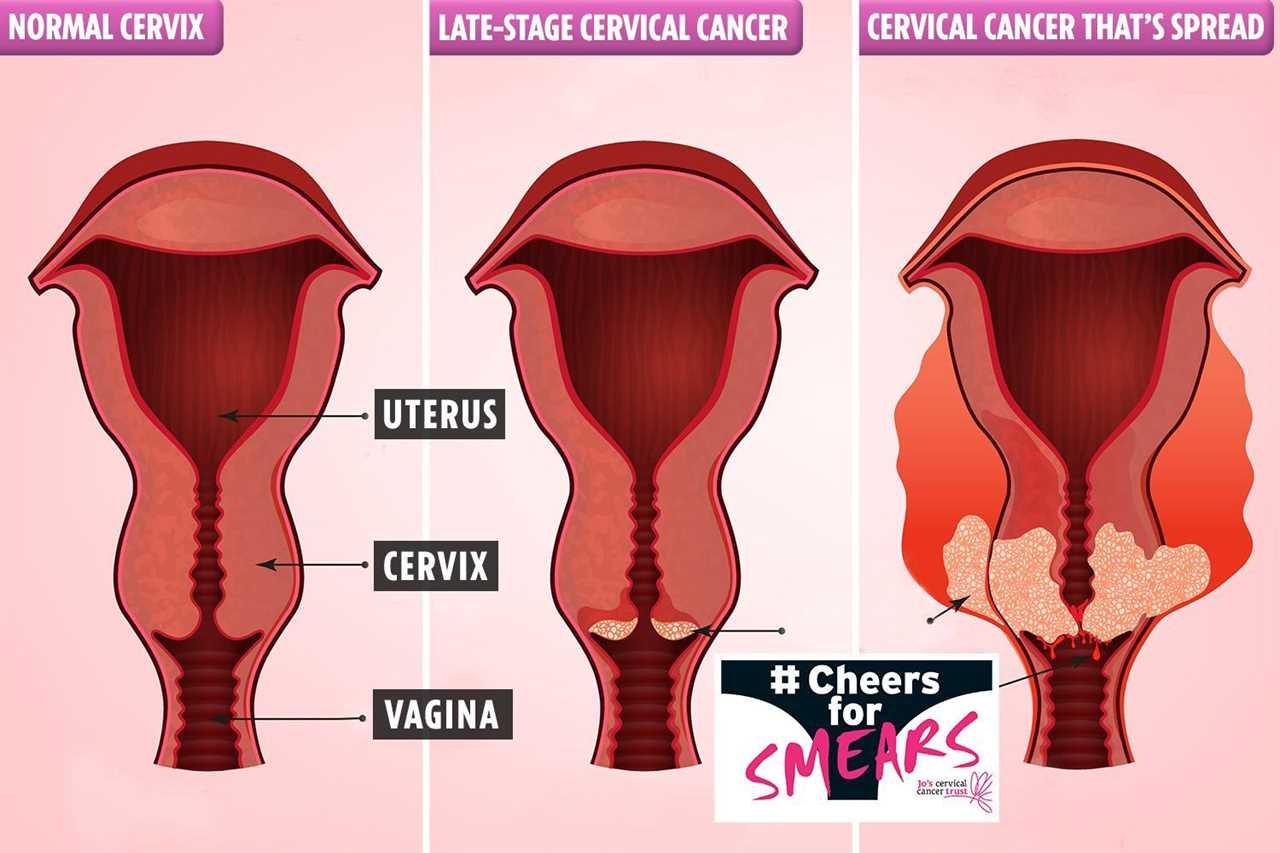EVERY year thousands of cases of cervical cancer are reported in the UK alone.
The Covid pandemic meant many women missed their cervical screening appointments due to fears around the virus, or delayed reminders.

Attending your smear appointment is crucial when it comes to preventing cervical cancer
But it’s never been more important to make sure you get that check done now.
Around 99.8 per cent of cervical cancer cases are preventable and early detection is key.
When Jade Goody died a decade ago of cervical cancer, it prompted nearly half a million more women than usual to go for a smear test.
In order to encourage more women to go for their checks, Fabulous Daily and Jo’s Trust, the cervical cancer charity, launched the #CheersForSmears campaign at the beginning of the year.
Gynaecologist and obstetrician for intimate wellbeing brand INTIMINA Dr Shree Datta said screening is important because if abnormal pre-cancer cells on your cervix are not treated, they can eventually turn into cervical cancer.
Around five million women a year are invited for cervical screening in the UK.
Catch it at the earliest stage – stage 1 – and you have the highest chance of surviving it. But get diagnosed at stage 4, and you’ve only got a 5 per cent chance of surviving five years or longer.
That’s why it’s absolutely crucial that you know what changes to look out for and get them tested ASAP.
There are things you can look out for to detect cervical cancer early – and therefore stop it from developing, here’s what you need to be on the lookout for.
1. Abnormal bleeding
Dr Datta said that one of the key symptoms to look out for when it comes to cervical cancer is abnormal bleeding.
She said that this could be after sex or between your usual periods.
If you have irregular periods anyway then this could be hard to spot, so you should look out for spotting.
Abnormal bleeding could also occur if you have been through the menopause.
The NHS states that abnormal bleeding does not mean that you have cervical cancer, but said you should get this checked out by your GP as soon as you can.
2. Vaginal discharge
Vaginal discharge which looks or smells unusual for you could be a sign of cervical cancer, Dr Datta said.
Everyone’s discharge is different, so it’s a case of knowing what is normal for you.
If you find that the colour, smell and consistency has changed, then that’s something you really need to have checked out.
When cancer lacks oxygen, it can cause an infection which leads to strange smelling discharge.
3. Blood in your urine
Dr Datta says that if you notice blood in your urine, then this could be a sign of cervical cancer.
If the cancer spreads into your vagina then this can cause significant damage resulting in bleeding.
The NHS states that this can be in your “vagina or back passage (rectum), or you may pass blood when you pee”.
4. A change in your bowel movements
If you’ve noticed that your bowel movements are a little different then this could be a sign of cervical cancer.
If your stool changed consistency over a long period of time then it could be time to visit your GP.
Everyone’s movements are different so it’s important to know what a change looks like for you.
 There are a range of symptoms that are consistent with cervical cancer – it’s important you know the signs
There are a range of symptoms that are consistent with cervical cancer – it’s important you know the signs
5. Bloating
Abdominal bloating could be a sign of cervical cancer.
Most of the time bloating is caused by something you have eaten, fizzy drinks or a change in diet.
But if you experience persistent bloating then it’s important you visit your GP.
6. Pain during sex
Pain during sex can be a sign of a number of different issues, but one is cervical cancer.
Because the disease often comes with no symptoms, pain during intercourse is one of the key indicators. It can be a sign that the cancer is spreading to surrounding tissues.
7. Lower back pain
It could be down to you straining something in the gym, or it could be a warning sign that something’s wrong with your reproductive organs.
Persistent pain – just one off twinges – in the lower back, pelvis or appendix can be a symptom of cervical cancer.

If you’re experiencing lower back pain then this could be a sign of cervical cancer
8. Unintended weight loss
While effortless weight loss might sound like the answer to many of our prayers, it’s never a good sign if it happens seemingly without cause.
A loss of appetite and unexplained weight loss tend to be signs that the body isn’t working properly – it’s trying to conserve energy. If you notice that you’re not eating as you normally do, go to your GP.
Dr Datta said the main risk factors for cervical cancer are having HPV infection and smoking.
She said: “Having other infections such as chlamydia or HIV can also increase your chance of developing cervical cancer.
“Taking the contraceptive pill for over 5 years may also slightly increase your risk of cervical cancer, as well as if you’ve had children.
“If another member of your family has had cervical cancer or if you’ve had certain types of cancer, such as kidney or vaginal cancer you are also at higher risk of cervical cancer.”
It’s important to remember that cervical cancer is treatable – which is why it’s so important to have your smear test when you are notified to do so.
Dr Datta added: “Most cervical cancers are detected at an early stage and can be treated.
“The type of treatment given really depends on the extent of the cancer – if detected early, you may have treatment to remove the abnormal area of your cervix, or a hysterectomy.
“We will also consider whether your family is complete when thinking about what treatment most suits you. “









